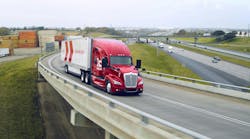Concerns ranging from protecting the environment to traffic congestion and highway safety is generating support among policymakers for what’s being called more “productive” commercial trucks—those that are both larger and capable of carrying more freight.
“This is the rare occasion where concerns about the environment, fuel consumption and freight efficiency are all coming together at the same time,” said John Woodrooffe, director of the transportation safety analysis division at the University of Michigan’s Transportation Research Institute (UMTRI).
Speaking at the recent “Moving the World: The Future of Freight Transportation” conference, hosted by Volvo Trucks North America (VTNA), Volvo Group North America, and the American Trucking Assns. (ATA at the Swedish embassy in Washington D.C., Woodrooffe added that at its heart the “more productive truck” issue is about increasing the size and weight of commercial vehicles so fewer of them are needed to haul an expected doubling of freight volumes over the next quarter century.
See Video from the conference: Making Trucks Productive and Why Heavier Trucks?
He also pointed out that increasing commercial vehicle size and freight hauling capacity can be done safety, with little impact on infrastructure, as evidenced by the experience of almost every other nation in the world, from the United Kingdom to Mexico.
“Truck productivity is limited by policy in this country, not technology,” Woodrooffe noted. “Size and weight policy is frozen by politics and what we’re saying is let science guide policy instead.”
Yet political opposition to bigger and heavier trucks as a concept seems to be thawing, said John Runyan, executive director of the Coalition for Transportation Productivity (CTP).
“The political reality surrounding this issue is shifting,” he noted at the conference. “Two years ago, when we started our group in the wake of the summer fuel price surge, I would never have thought states like Maine and Vermont would be pilot-testing heavier trucks on their highways.
“But the political landscape has shifted due to this conflux of environmental, fuel consumption, and highway congestion,” he added. “ So we have a shot at this.”
See Video from the conference: Making Trucks Productive and Why Heavier Trucks?


